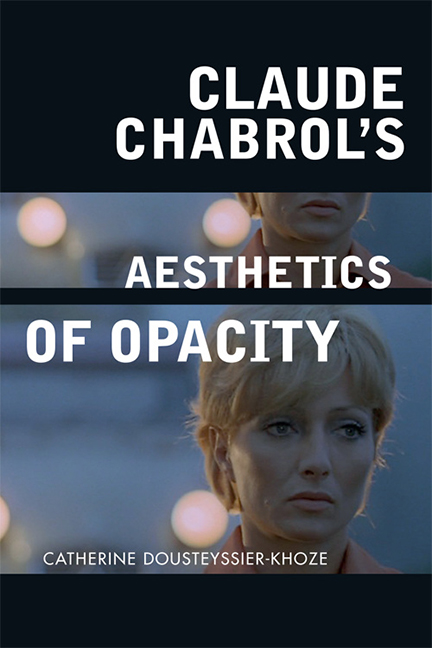Book contents
- Frontmatter
- Contents
- List of Figures
- Acknowledgements
- Dedication
- Introduction
- 1 Contexts and Influences
- 2 Chabrol and Genres
- 3 The Human Beast
- 4 Family Secrets
- 5 Chabrolean Spaces as Heterotopias of Crisis
- 6 Through the Looking Glass: Chabrol’s Mirrors and the ‘Crystal-image’
- Conclusion: Towards an Aesthetics of Visual Opacity
- Filmography
- Bibliography
- Index
2 - Chabrol and Genres
Published online by Cambridge University Press: 10 November 2020
- Frontmatter
- Contents
- List of Figures
- Acknowledgements
- Dedication
- Introduction
- 1 Contexts and Influences
- 2 Chabrol and Genres
- 3 The Human Beast
- 4 Family Secrets
- 5 Chabrolean Spaces as Heterotopias of Crisis
- 6 Through the Looking Glass: Chabrol’s Mirrors and the ‘Crystal-image’
- Conclusion: Towards an Aesthetics of Visual Opacity
- Filmography
- Bibliography
- Index
Summary
Generically speaking, Chabrol's output is remarkably diverse: he has filmed farce, melodrama, fantasy, war films, spy films, literary adaptations (Madame Bovary) and even a documentary on World War II propaganda (L’Œil de Vichy/The Eye of Vichy). However, his name remains mostly associated with the crime thriller (and to a lesser degree with the melodrama), or, more specifically, with what one may call the bourgeois thriller, where murders occur within the claustrophobic confines of the bourgeois family, and/or provincial town.
Since the 1960s, film theory has been looking at genre as a key critical concept, not merely as a means of classification but also by taking into account modes of production, spectator expectation and critical reception, that is, the various types of constructs and discourses that shape ‘genericness’. There is still a general assumption that the ratio of a film's auteurship is inversely proportional to a film's genericness, that is, to its generic composition. As Raphaëlle Moine pointed out in Les Genres du cinéma (2005), critics are generally interested in showing how an auteur's film subverts, parodies and/or goes beyond a genre. In this chapter I shall try to reconcile the ‘paradox’ by showing how Chabrol often works within the confines of a genre (the thriller) while remaining an auteur and retaining a distinctive voice (Le Boucher). But more reflexive and ‘slippery’ films will also be focused on, in which the concept of genre itself becomes problematised within the narrative (Masques; La Fille coupée en deux; and Bellamy).
In many respects, Chabrol created the modern French thriller. We shall see at the end of this chapter that the adjective ‘chabrolien’ is widely used in relation to contemporary films, thereby sealing Chabrol's lasting legacy on the psychological thriller. However, when defining and discussing the meaning of the French thriller, film specialists often choose to focus on the influence of America and/or film noir and end up categorising it as a vehicle for the discussion of the processes of modernisation or urbanisation. Even though many of Chabrol's films can be interpreted as stories of desire and betrayal, and retain the moral ambiguity of the film noir, the direct influence of American models is questionable, and in any case much less significant than for Godard and Truffaut.
- Type
- Chapter
- Information
- Claude Chabrol's Aesthetics of Opacity , pp. 43 - 71Publisher: Edinburgh University PressPrint publication year: 2017



